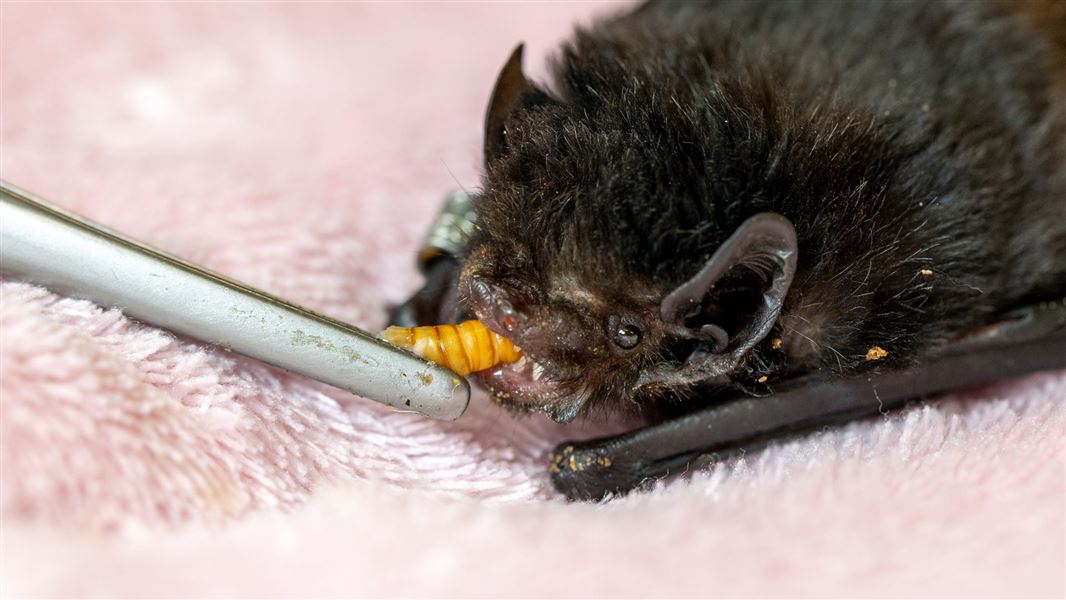Archived content: This media release was accurate on the date of publication.
Date: 08 November 2022
The adult female bat was released at semi-rural location just outside Hamilton last night. The release site is in flying range of where the animal was found in late July.
A small number of staff from DOC and Hamilton Zoo, joined by an iwi representative, were present for the release of the animal, which occurred at dusk.
The release took only a few minutes, with the bat quickly disappearing out of site once removed from its transportation container.
DOC checked with a local community organisation based at the site, and the Waikato District Council, to ensure there were no planned group or community activities which might have startled the bat, before proceeding with the release.
DOC bat specialist Dr Kerry Borkin says the rehabilitation of the pekapeka is a conservation success story given the animal’s plight when it was originally discovered.
“The bat had made a remarkable recovery from its injuries and had reached the point where it needed to be returned to a suitable natural environment to live out the rest of its life,” she says.
“The Hamilton Zoo staff must be acknowledged for the tremendous and patient work they have done to give this animal a second chance after it was handed into them suffering injuries from its encounter with the cat.
“We also want to recognise the efforts of the people who found the bat initially and realised it needed specific care. They passed it over to a local vet who then transferred it to Hamilton Zoo.”
Hamilton Zoo head veterinary nurse Trudy Willetts says initial signs were worrying as the bat was stressed from the traumatic injury and the new environment.
“The membrane between the right leg and her tail was completely torn and there were concerns it might not reattach and she’d be unable to fly.”
But the zoo team refused to give up, instead developing a plan to get the bat stabilised and then provide the specialised care to give her the best chance of survival and eventual release.
“Despite everything the bat was really compliant, and we were able to get her eating and building up her strength quite quickly, and her membrane started to heal,” Trudy Willetts says.
“As she improved, we moved her from the incubator to a soft playpen with supervised flight times. Once it was clear she could navigate around the clinic, she graduated to her own room where she could fly whenever she wanted, although we still had to hand-feed her three times per day.”
Despite the improvement, concerns around the ability to release the bat were raised when she started losing fur.
“We knew we wouldn’t be able to release a bald bat, so had to reassess her care and change things such as the type of gloves we used, how often we handled her, and parts of her diet,” says Trudy Willetts.
“The combination worked, and we started seeing new hair growth. It’s now fully regrown and she is ready to go.”
Trudy Willetts says she will have “so much time back” after the release, but it had been an invaluable learning experience for the team.
“She has taught us so much and we are prepared if any other bats do come in needing special care, although we’re hoping they don’t!”
The story of this animal is a reminder of the need to protect our native bats and for cat owners to be responsible in management of their pets.
Long-tailed bats have the highest threat ranking of ‘nationally critical’. In addition to predators, other threats to bats include felling of trees in which they roost, and loss of vegetation, which they use for foraging and moving across the countryside. So, other ways to protect bats include planting and keeping old trees.
Anyone who finds an injured bat should call DOC on 0800 DOC HOT (0800 362 468) immediately to seek advice.
Read more about long-tailed bats/pekapeka.
Contact
For media enquiries contact:
Email: media@doc.govt.nz
